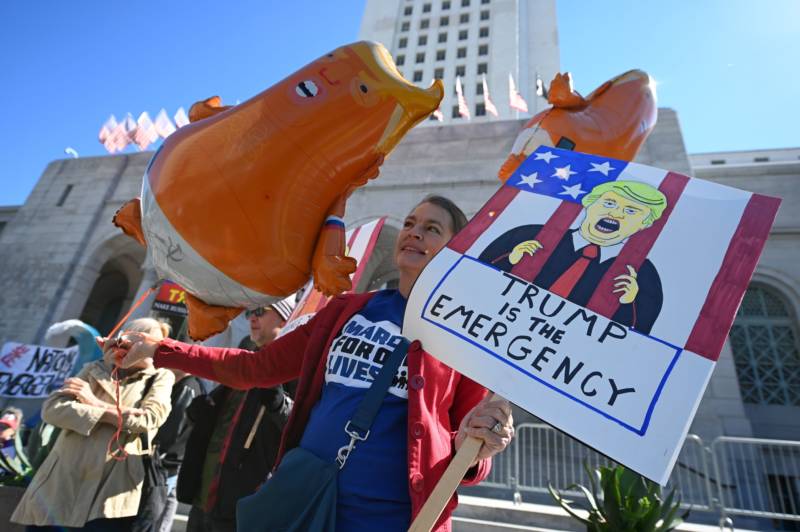In Los Angeles, Rep. Maxine Waters spoke in front of a crowd outside city hall. More than 200 events were planned around the country, according to MoveOn's website, which described the protests as "rapid-response events on Presidents Day against Trump's fake crisis and racist deportation force and to stand with immigrant, Muslim, and Black and brown communities to stop Trump's dangerous and illegal power grab."
"I just think that's a ridiculous waste of our money. There are better ways for us to have a secure border," said Reid in Oakland. "And I don't think it's not a crisis; I know it's not a crisis."
According to The Associated Press, some counter-protesters joined the demonstrations, including in Washington D.C., where there was a brief scuffle in the crowd.
California Attorney General Xavier Becerra used the holiday to file a promised lawsuit against the administration's use of national emergency powers to secure border funding. California was joined by more than a dozen states in the lawsuit.
"By today, we will file our case against the president’s misuse of executive power and do everything we can to try to stop him from raiding taxpayer money and using it for a border wall that has not been authorized," Becerra said in a press conference.
"We are a border state. Anything that the president does through this declaration of emergency, or fake declaration of emergency, could impact what we do on the border and the people and our interests along the border."
Trump, however, appeared ready to stand behind his declaration, according to NPR.
The president declared a national emergency at the U.S.-Mexico border on Friday to secure up to $8 billion in funding for a barrier on the southern border — more than four times what Congress approved.
House Democrats have called Trump's declaration "unlawful," and are considering a joint resolution disapproving of the declaration. Senior adviser Stephen Miller made it clear during a Fox News interview on Sunday that the president is unlikely to back down.
A resolution of disapproval would allow Congress to overturn Trump's declaration and would likely pass in the Democratically controlled House of Representatives. But it would face uncertainty in the Senate, where multiple Republican lawmakers would have to join with Democrats in the minority.
If Trump vetoes the resolution, Congress would need a two-thirds majority in both houses to override it, which is unlikely given the political makeup of the chambers. If Congress were unable to override a Trump veto, the House could sue based on the argument that only Congress has the power to appropriate funds.
Sara Hossaini and Peter Jon Shuler, KQED; Matthew Schwartz, NPR; and the Associated Press contributed to this report.
